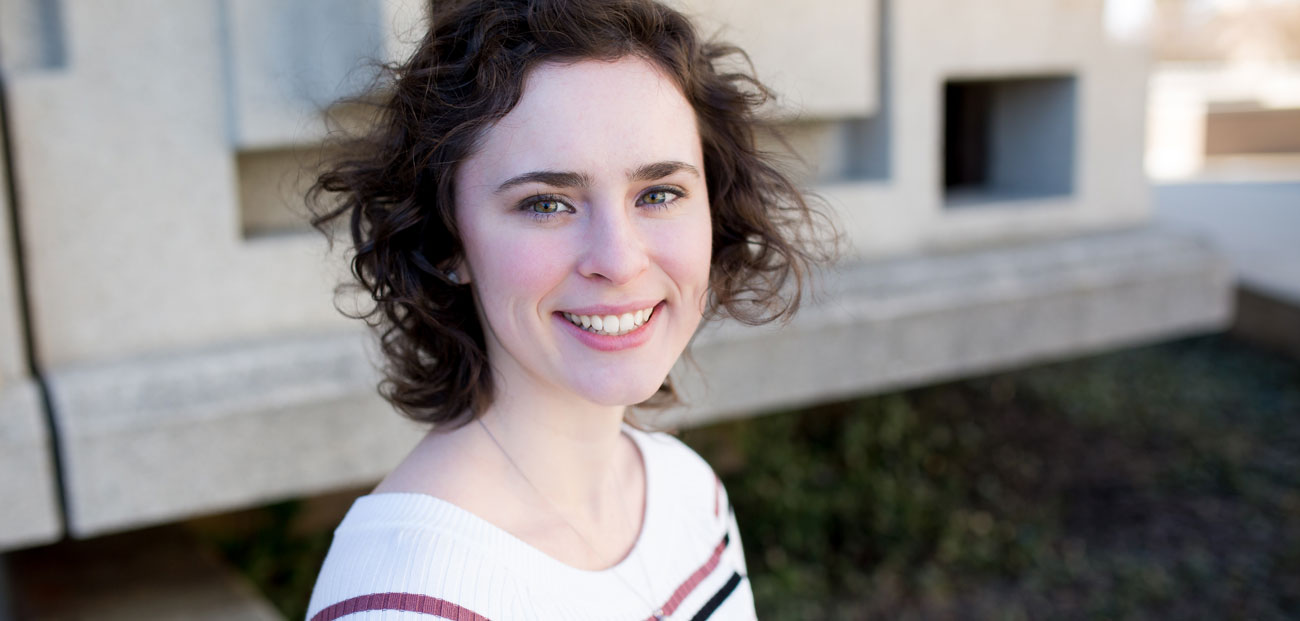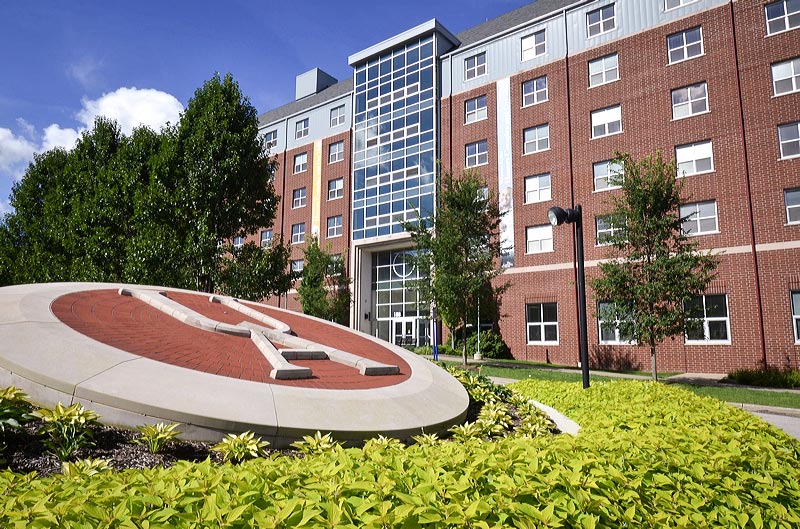All in a day’s work: Engineering student conquers cancer and courses
When Lea Carroll, a master’s student in Washington, D.C., learned that her younger sister, Anny Carroll, was diagnosed with Hodgkin lymphoma, she rushed to their home in Youngstown, Ohio, to tell her she was going to drop out of school to take care of her.
“That’s weird,” Anny said, after staring at her sister for a moment, “because I’m going back to work.”
It was at work – at Crane Aerospace & Electronics in Elyria, Ohio, where she was completing a co-op assignment through the College of Engineering at The University of Akron (UA) – that Anny, a few weeks earlier, had discovered a lump protruding from her neck.

Anny Carroll, an engineering major, will join an aerospace manufacturer after graduating this spring. She overcame a cancer diagnosis while attending college.
And, among all the thoughts that raced through her mind, when her parents sat her down and told her, in tears, that the biopsy of the swollen lymph node had come back positive, it was the dreadful thought of missing work that, like some slow-circling, large-winged bird, threw its shadow on all the rest.
“But I love my co-op so much; I want to go to school!” cried Anny, whose dream of being an engineer, born in the fourth grade, had almost fully matured at UA.
So, after learning that the cancer, in stage IIIB, had spread from the left side of her neck to the center of her chest and down to her left hip, she went back to work.
“I just didn’t like sitting around,” she said. “I needed to be doing something – I couldn’t go from being busy all the time and make a complete 180 and not do anything.”
Learning as a distraction
At first, she didn’t tell her supervisor or coworkers why she was going to the doctor so often, and eventually daily. When she finally did tell them, they insisted that she stay home.
Anny, who was scheduled to receive her first, and strongest, round of chemo on an upcoming Thursday, told them, despite their protests, that she would be back to work the following Monday.
But the chemo hit harder than she had expected.
“The first one was terrible,” Anny said. “I got pretty sick … and I was in a lot of pain.”
Her white blood cell count dropped dramatically after the first treatment, requiring her to receive daily shots to boost her immune system.
“They checked how many white blood cells I had – which is what fights off infections – and you’re supposed to have about, like, 5,000 immature white blood cells, and I only had, like, 48,” she said.
She stayed home for the next week, then returned to work for a brief period, and then concluded her co-op a week and a half earlier than scheduled, going home for winter break. She spent the next month with family and friends, receiving another round of chemo every other week – all the while longing to return to school for the spring semester.
“I love my family, and I loved how much they did for me, and it was fantastic being with them, but when you’re just at home, you’re constantly reminded of the fact that you’re sick, and people come to visit you because you’re sick,” Anny said. “I just really wanted to keep learning, because I needed it – as a distraction almost.”
Support from UA
Over break, she and her classmates received an email from the College of Engineering, reminding them that the upcoming semester would be one of the most important to date, and that employers would be watching them closely.
Anny, who by this time was experiencing serious fatigue, wondered if she would even be able to carry textbooks and walk to classes for an entire day, let alone handle the academic rigors of the semester.
She worried that she would have to skip the semester and miss out on graduating with her friends, which was very important to her.
On the advice of a recent UA graduate, who also had Hodgkin lymphoma, Anny contacted UA’s Office of Accessibility, which provides accommodations and support for students with disabilities and illnesses.
“They really helped me a lot,” she said. “They sent letters to my professors, and had copies of all my textbooks online, which I could use on my iPad, so that I didn’t have to carry them. They even said if my classes were too spread apart, they would move the whole class to make it closer. … It was very reassuring, that they were going to help me.”
Since Anny’s doctor required her to eat six small – and dismally bland – meals per day, the Office of Accessibility also stipulated, in its letters to professors, that she be permitted to eat and drink in class when necessary.
“I emailed my professors, and right away they told me not to worry,” Anny said. “They said their slideshows were online if I needed them, and if I had to miss class, they would meet with me separately. They were amazing about it. I don’t know if I would have got that same treatment at other schools.”
Close friends
Her immune system still weakened, she returned to school wearing a facemask and surrounded by a squadron of four friends armed with Lysol wipes – like four gigantic white blood cells, ready to make war against dirty desks, door knobs and runny-nosed peers.
“Everything had to be so clean,” Anny said. “My friend carried Lysol wipes on her – she Lysol’d everything. … Every time someone was going to come over to our room, my friends were like, ‘Are you sick? If so, you can’t come over.’”
In lieu of daily shots to boost her immune system after chemo treatments, Anny was given a patch to wear on her left arm, which would dispense medicine to promote the growth of white blood cells.
“The first week I had it, I was doing a group project with my friends, and I kind of forgot that I had it on, and when it starts to go off, it will make a buzzing noise,” Anny said.
Her friends, alarmed when they first heard the noise, leaped into phalanx formation. Anny assured them that she was quite all right, but they were not satisfied until they had personally inspected the strange device and given the all-clear.
“The experience definitely brought me a lot closer to my friends,” Anny said, adding that she met many of them her freshman year through the Honors Emerging Leaders program, a Living-Learning Community of aspiring leaders in the Williams Honors College. “They were always there for me, and I couldn’t be more thankful for all my friends I made at Akron.”
One of those friends, fellow engineering major Taylor Verba, organized a Relay for Life team through Tau Beta Pi, an engineering honor society, in Anny’s honor. Anny’s parents, Anita and Bill, and other family members and friends helped raise a little under $5,000 of the $6,200 in total donated by the team to the American Cancer Society.
Finally, after months of going to and from Youngstown for treatment, of battling the mental fog and fatigue of what she called “chemo brain,” of enduring nausea and pain and tasteless food, of dodging and destroying germs, of quarantining herself in her apartment on weeknights, and sleeping for entire weekends, Anny received her first cancer-free scan on March 8, 2018.
And, remarkably, she received all A’s at the end of the semester.
'Radiation' of love
Anny credits faculty, staff, friends and family – what might be called a large-scale, external immune system, a “radiation” of love and warmth more powerful than any anti-cancer drug – for her recovery and academic success.
“I had a huge support system, both at school and home, which was definitely a factor in getting better,” she says, adding that, in some ways, going to school after her diagnosis was like going home to convalesce.
“Looking back, I really appreciated being able to go to school, I appreciated my education a lot more, because a lot of people with cancer aren’t able to go to work or school or stay busy, and they take a downturn, but it was uplifting to still be able to come to UA,” she said. “It has become like a second home to me.”
Anny will continue to see her doctor every three months for scans, with the goal of decreasing her visits to once every six months, then once a year, and finally once every five years.
“I feel great now,” she says. “I had a very curable cancer … and I was lucky enough that it was only just one bad year, and now I’ve moved on from it.”
And, as she told her sister, she’s going back to work.
After completing her fourth and final co-op assignment at Crane Aerospace last summer, she accepted an offer to join the company as a full-time design engineer this July.
Williams Honors College
Students in our prestigious Williams Honors College live in the Honors Residence Hall with other high-achieving, self-motivated students. They can apply for additional scholarships, and gain leadership experience through student organizations and through the Honors Leadership Summit. Further, students in the Williams Honors College design their own research focus, and get personal attention from faculty advisers.

 Students in our prestigious Williams Honors College live in the Honors Residence Hall with other high-achieving, self-motivated students. They can apply for additional scholarships, and gain leadership experience through student organizations and through the Honors Leadership Summit. Further, students in the Williams Honors College design their own research focus, and get personal attention from faculty advisers.
Students in our prestigious Williams Honors College live in the Honors Residence Hall with other high-achieving, self-motivated students. They can apply for additional scholarships, and gain leadership experience through student organizations and through the Honors Leadership Summit. Further, students in the Williams Honors College design their own research focus, and get personal attention from faculty advisers.